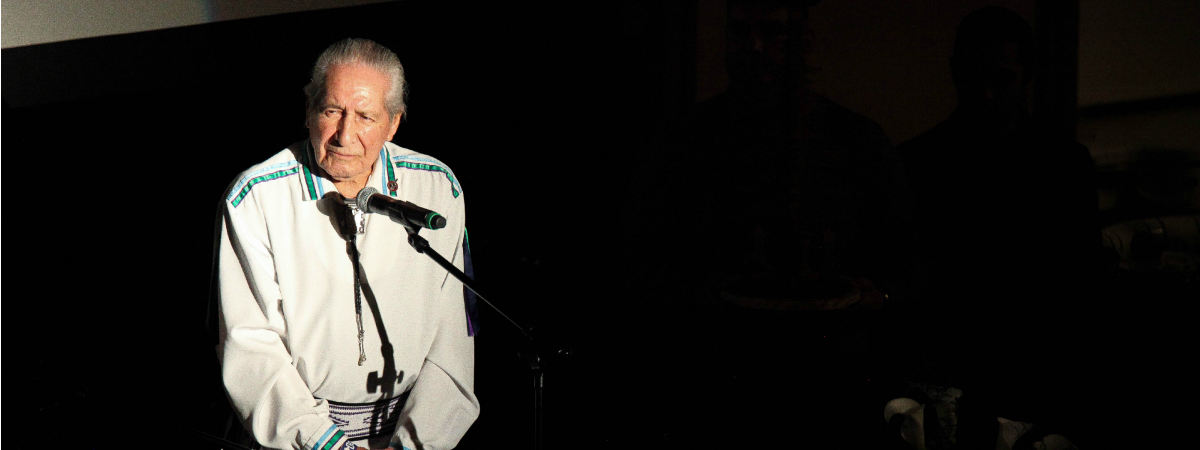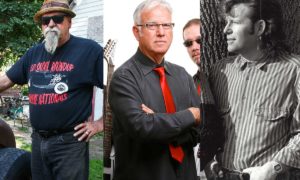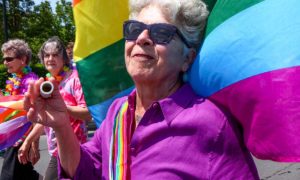At 89, Oren Lyons acknowledges he’s slowing down. A recent back operation “took me off the dance floor and off the lacrosse field,” the Onondaga Nation faithkeeper and internationally renowned advocate for indigenous rights and environmental stewardship said. For decades Lyons has acted as the world’s conscience — or scold, depending on your perspective — advocating an ethic of peace, equality and respect for the world’s resources.
He grew up on the Onondaga Nation, where he, his brothers and friends spent entire days running among the trees. “The whole territory was our playground,” he recalled. “There was a lot of open land. There were big fields of corn and potatoes and beans and squash. Those were fundamental foods.”
Onondaga Creek “was loaded with fish,” he said. “The water was clear. You could see right to the bottom. That same crick, you can’t see 1 inch now. It’s all polluted from the mining in Tully.”
He reminisced about his life in a Syracuse New Times interview Sunday, May 19, in the Presidential Suite at the Syracuse Marriott Downtown before a gala celebrating his life. The crowd of about 400 included members of several Native communities, people from Central New York and visitors from as far away as Sweden. Some guests dressed casually; others wore sequined dresses, tuxes or full Native regalia.
The invitation list included Lyons’ Syracuse University lacrosse teammate Jim Brown, actor Leonardo DiCaprio (Lyons appeared in DiCaprio’s 2007 documentary The 11th Hour) and actor Mark Ruffalo (the three marched together at the 2014 Peoples Climate March in New York City). Those guys didn’t show. Still, the sold-out reception and dinner overflowed with friends, family, colleagues and admirers.
“It’s a pretty diverse group and my father is the glue,” said Rex Lyons, former Nationals player and leader of the band The Fabulous Ripcords.
Lyons cheerfully posed for dozens of photos, including lots of selfies, seemingly speaking with nearly everyone at the event. Lyons greeted former lacrosse team member Roy Simmons Jr. with a fierce hug. Simmons, head coach of the Syracuse Orange men’s lacrosse team from 1971 to 1998, praised his longtime friend for telling him to “put down the whistle, get out of the gymnasium and have some fun with me. I’ve never regretted it.”
Another emotional tribute came from Sid Jamison, a Mohawk who served as the first head coach of the Iroquois Nationals. He also coached Bucknell University’s men’s lacrosse team.
“Thank you for giving me back my history and culture,” Jamison said. “You gave me the purpose of time and place we all seek. My experiences with the Iroquois Nationals have been life-changing.”
Tributes highlighted Lyons’ intertwined passions: the game of lacrosse both as a sport and a metaphor for the sovereignty and survival of the Iroquois Nation. He was an All-American lacrosse goalie, leading SU to a perfect record in 1957. He has addressed the United Nations many times and played central roles in numerous high-profile Native-rights events, including the 1972 Trail of Broken Treaties caravan that sought to bring national attention to Native American issues; the 1973 Wounded Knee, South Dakota, occupation; and the 1990 land-use dispute at Oka, Quebec.
Gala speakers addressed seven topics — echoing the Iroquois concept of taking actions that will benefit seven generations — that represent Lyons’ life: environmental, global leadership, lacrosse, faithkeeper role, indigenous rights and the United Nations. None of the speakers stuck to the three-minute limit.
Betty Lyons, director of the American Indian Law Alliance, thanked “Uncle Sonny” for “not losing your humor on our many car rides when I get us lost.” She also praised him for bringing indigenous issues and climate change to the international stage. “If you can find the energy to keep going, so can I,” she said. “I promise you I’ll never give up.”
The program included video messages from longtime climate change activist and former Vice President Al Gore and Mark Parker, CEO of Nike, which has sponsored the Iroquois Nationals since 2006.
Joanne Shenandoah, the Grammy-winning musician and a member of the Wolf Clan of the Oneida Nation, performed a piece she wrote for the occasion. “Life will go on. It’s not too late,” she sang. “I’m keeping the faith, for all who will listen. Our ancestors told us: Keep singing our song.”
Lyons has tried to do just that: promote Native American pride amid a dominant culture of greed and selfishness. “The unfair distribution of wealth is one of the biggest problems,” he told the Syracuse New Times. “What about the rest of the people? It’s not as if there’s not enough to go around.”
He noted that recent United Nations reports say that 1 million species face extinction as a result of climate change and that the world must act within 12 years to reduce carbon emissions before reaching “a point of no return.”
Lyons and other indigenous leaders have been sounding the alarm for years. In a 2000 statement to the U.N. Peace Summit, Lyons warned that “the ice is melting in the north.” He repeated the warning to the United Nations in 2014.
“Now they tell us we have 10 years left before we’re at the point of no return,” he said. “How do you talk to a person who’s working hard, separating garbage and recycling, when we have corporations saying we need bigger pipelines now?”
He sees the 2020 presidential election as a key to survival. “What are the Americans going to do about it? You can’t expect the Indians to do it,” he said. “We’re just trying to hang in there.”
The popularity of lacrosse highlights Iroquois success in “hanging in there.” Lyons co-founded the Iroquois Nationals in 1983. The team ranks third in the world after winning bronze at the 2018 World Lacrosse Championship in Israel.
The International Olympic Committee (IOC) executive board voted in late 2018 to add lacrosse to the 2028 Olympics as a trial sport. But an Olympic Charter rule threatens to recognize the Iroquois as a sovereign nation. That issue kept the Nationals from the 2010 world championship in Manchester, England, when the United Kingdom refused to recognize Iroquois passports. In July 2018, the same issue delayed the Nationals from the Netanya, Israel, contest.
Lyons is confident the IOC will resolve the problem. “As far as I’m concerned, we’re going to play again,” he said. “If you’re saying it’s going to be the world games, how can you leave out one of the top teams in the world?”
Lyons, formerly an aggressive lacrosse player and spirited dancer, leaned on his cane while addressing diners at the gala’s close. He apologized to his family, including daughter Lonnie and son Rex, for the times work kept him from home. He noted that the community had recently “raised up” two new chiefs, making way for a new generation of leaders.
He has no regrets about his life, and views aging as part of the cycle of nature, he said earlier. “We’re instructed to be ready to go every day,” he said. “You get up every day and don’t know if you’ll see another sunset.”
[fbcomments url="" width="100%" count="on"]













